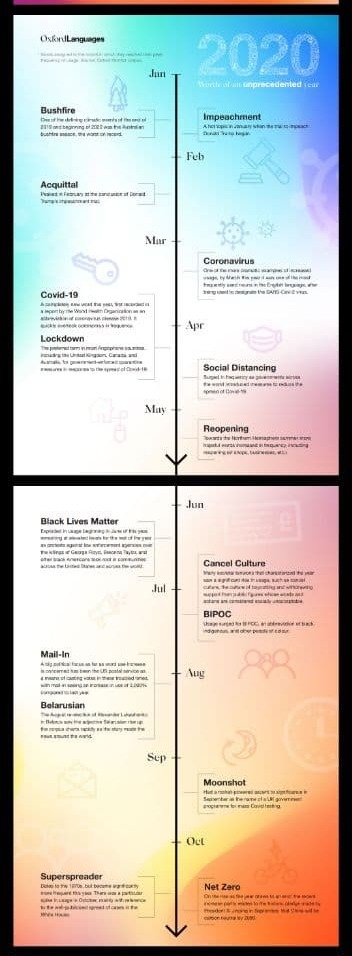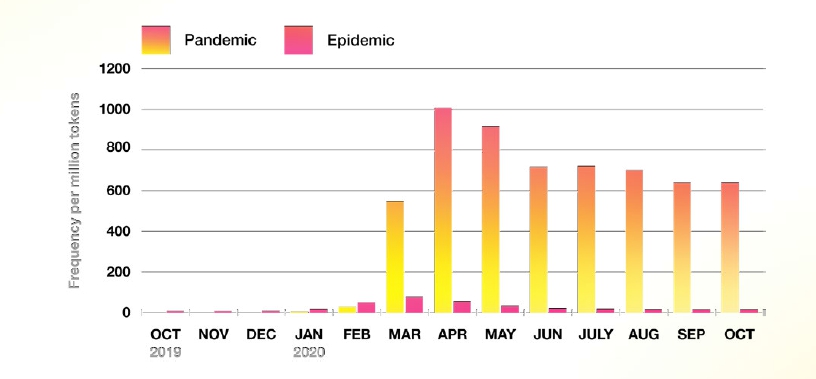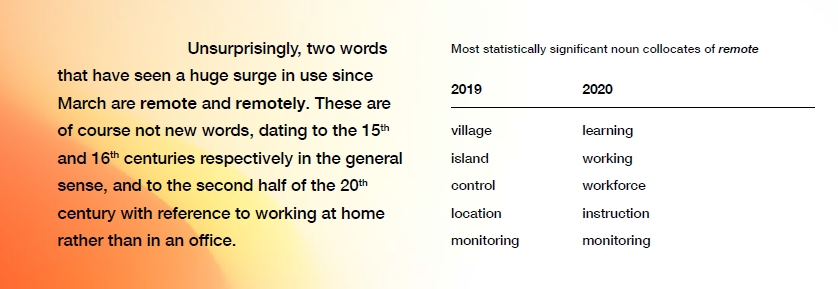
The Oxford Dictionary has a tradition - every year in November-December to choose a word or phrase that characterizes the year as a whole. In 2019 it was "Climate emergency".
2020 turned out to be so strange that linguists simply could not choose just one word. And they chose as many as 16. A
fresh report from Oxford Languages' Words of 2020 came out just a few days ago, and in its description the compilers honestly wrote: the year is unprecedented, so the report will be the same.
What words the experts have chosen to describe 2020, and why - read this article.
16 non-swear words that describe 2020
In 2020, it is impossible to single out any one event or process that has seriously affected the whole world. Because almost every month there was something like that.
And the experts decided to make a digest of words that formed the agenda for each separate period of time.
Detailed list under the spoiler


A lot of strange things happened in 2020. Linguists have decided that the most significant words are best presented in groups.
Coronavirus is taking over the Oxford Dictionary
Everyone has heard about the coronavirus today. This is by far the main event of 2020, and it never dreamed of ending. Therefore, it is the coronavirus pandemic that is given as many as 7 words out of 16:
- Coronavirus - coronavirus
- COVID-19
- Lockdown - lockdown, quarantine, strict isolation
- Social distancing —
- Reopening —
- Moonshot — ,
- Superspreader —
The coronavirus was known as a type of virus back in the 1960s. But until 2020, it was used exclusively by virologists. The word could be found in scientific monographs, dissertations and medical periodicals.
In January, everything changed. Information about the new virus got into the media and the frequency of occurrence of these words in online publications and social networks has grown by orders of magnitude - now every thousandth word is associated with coronavirus.
And that makes it one of the most common significant nouns of 2020.

The word "Pandemic" shows a slightly lower result in absolute terms, but just think - compared to 2019, the frequency of its use on the Internet has increased by 57,000%.

For other "viral" words, the situation is similar. Only "moonshot" stands out from the row. Because it is indirectly related to the viral theme.
Moonshot is the name of the UK government's COVID mass testing program launched in September.
According to experts, this word in the dictionary is “one of the few rays of light in the dark sky of 2020”.
Remotely is the word that has changed the most
In 2019, the word “remotely” was most often used with “village”, “island”, “control”, “location”, “monitoring”.
That is, most often people were interested in some remote villages, islands and locations. And a little more - with remote control systems.
In 2020, the context of the word has changed completely. Now looking for distance learning, teaching and work. No one is trying to run away - everyone is trying to adapt to current conditions.

The urgency of this change was felt unprecedentedly. If since 2010 the number of users has grown smoothly and steadily, then in 2020 there was a boom. Our free language learning apps have doubled in activity since March. And the attendance of talking clubs in March grew by 37%.
And the situation is similar with almost all major players in the EdTech market. Therefore, in our ranking, the word "remote" reflects 2020 more than correctly. And what is important - no negative context.
Politics: Trump, Trump again and a little Lukashenka
The year was also rich in political events. Their linguists also noted in the report. 4 words out of 16 turned out to be political:
Impeachment —The political agenda of the year is mainly related to events in the United States: Trump's impeachment and acquittal in court proceedings on charges of abuse of power and obstruction of the work of Congress.
Acquittal —
Mail-in —
Belarusian —
The word "mail-in" does not fit without context, but it refers to the ability of US citizens to vote by mail without waiting for the actual voting day.
The country is large and not everyone has the opportunity to come to the polling stations. Therefore, everyone has the opportunity to vote by mail. And experts note that there is simply a huge field for falsifications. Actually, the 2020 US elections were also marked by this - there were enough scandals.
"Belorussky" was here because of the protests in Belarus after the announcement of the election results. They also received a fairly strong resonance in the world, which earned a special place among the words of 2020.
A little J.K. Rowling, ecology and anti-racism
Three words are devoted to the topic of social movements and processes in the world in the Oxford report. Ecology and the environment are two. Here they are:
Black Lives Matter - Black Lives Matter
Cancel culture - abolition culture, boycotting a person for expressing an unpopular opinion
BIPOC - an acronym for Black, indigenous, people of color - Black, indigenous and colored people
Bushfire - wildfire (Australian expression)
Net Zero - zero level emissions
A lot has already been said about BLM and BIPOC. Therefore, we will not dwell on them. This is the second most talked about topic in the world after the coronavirus and the pandemic.
But cancel culture should be discussed separately. Because this is a truly paradoxical phenomenon that has spread in 2020.
Cancel culture is the practice of condemning a public person for expressing an unpopular opinion or being noticed in some condemned activities.
. « » 2020 « » (Troubled Blood), .
, , . Twitter Facebook #RIPJKRowling, , .
The word "smelly", but fits perfectly into 2020, because such large-scale media harassment of famous personalities began only in it.
Now about ecology.
"Bushfire" is the Australian version of the word "bushfire". And the "bush" part here is not really "bush", in Australian English it also means "large areas covered with bushes and undersized trees." That is, literally the word is translated as "fire in a large area."
At the beginning of the year, colossal fires raged in Australia, which destroyed millions of acres of forests. And although they talked about this much less than about coronavirus or BLM, this is a global event and a real disaster for the environment.
And let's end with good news. Chinese leader Xi Jinping announced to the world that by 2060 China will enter production with zero carbon dioxide emissions.
The phrase "Net Zero" is just about that. The plans of the Chinese nomenclature are to completely overhaul the structure of industry throughout the country. This is a very important step towards solving the issue of global warming and air pollution.
The choice of the main phrase of 2020 has turned into a real digest of the most important events, which linguists expressed with just 16 words. And we think this is an interesting move from the Oxford Dictionary.
By the way, do you have any ideas how you can expand this list of words? What other expressions will characterize the year best? Write your options in the comments.
Just this, keep yourself within the bounds of decency :)
Online school EnglishDom.com - inspiring to learn English through technology and human care

Only for Habr readers, the first lesson with a teacher on Skype is free ! And when buying classes, you will receive up to 3 lessons as a gift!
Get a full month of ED Words premium subscription as a gift .
Enter the promo code oxford2020 on this page or directly in the ED Words app . The promo code is valid until 11/27/2021.
Our products:
- Learn English words in the ED Words mobile app
- Learn English from A to Z on the ED Courses mobile app
- Install the extension for Google Chrome, translate English words on the Internet and add them to study in the Ed Words app
- YouTube- EnglishDom